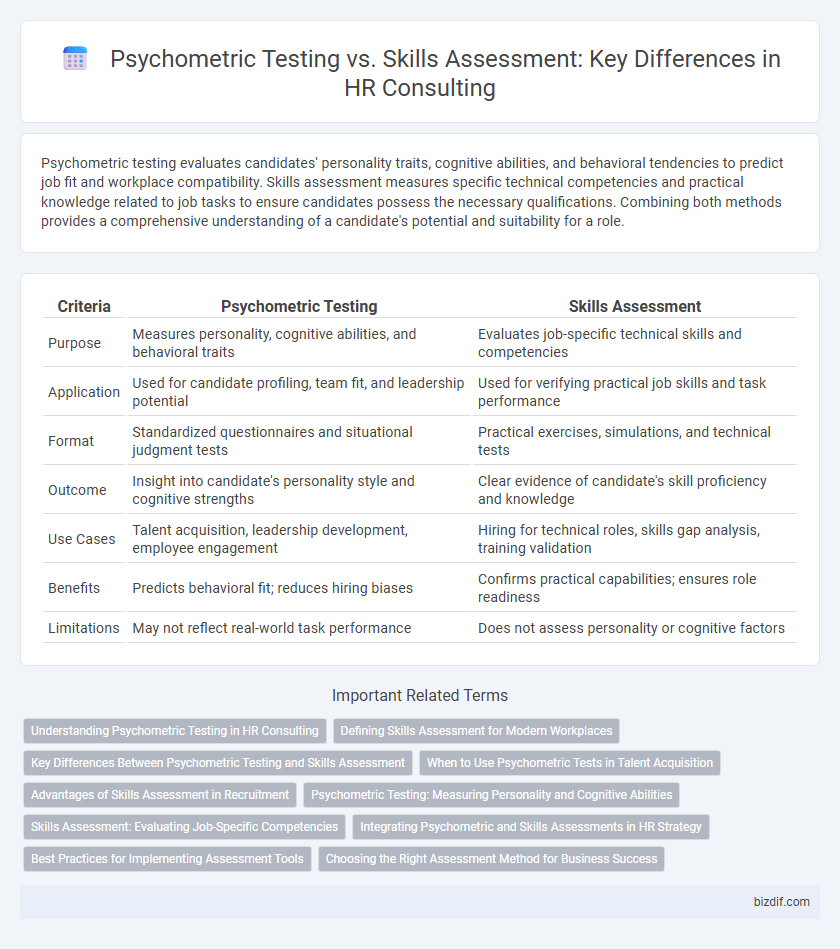Psychometric testing evaluates candidates' personality traits, cognitive abilities, and behavioral tendencies to predict job fit and workplace compatibility. Skills assessment measures specific technical competencies and practical knowledge related to job tasks to ensure candidates possess the necessary qualifications. Combining both methods provides a comprehensive understanding of a candidate's potential and suitability for a role.
Table of Comparison
| Criteria | Psychometric Testing | Skills Assessment |
|---|---|---|
| Purpose | Measures personality, cognitive abilities, and behavioral traits | Evaluates job-specific technical skills and competencies |
| Application | Used for candidate profiling, team fit, and leadership potential | Used for verifying practical job skills and task performance |
| Format | Standardized questionnaires and situational judgment tests | Practical exercises, simulations, and technical tests |
| Outcome | Insight into candidate's personality style and cognitive strengths | Clear evidence of candidate's skill proficiency and knowledge |
| Use Cases | Talent acquisition, leadership development, employee engagement | Hiring for technical roles, skills gap analysis, training validation |
| Benefits | Predicts behavioral fit; reduces hiring biases | Confirms practical capabilities; ensures role readiness |
| Limitations | May not reflect real-world task performance | Does not assess personality or cognitive factors |
Understanding Psychometric Testing in HR Consulting
Psychometric testing in HR consulting measures candidates' cognitive abilities, personality traits, and behavioral styles to predict job performance and cultural fit. Unlike skills assessments that evaluate specific technical competencies, psychometric tests provide deeper insights into emotional intelligence and problem-solving approaches. Organizations use these tests to enhance hiring decisions, improve employee development, and reduce turnover by aligning individual profiles with role requirements.
Defining Skills Assessment for Modern Workplaces
Skills assessment in modern workplaces evaluates employees' practical abilities and job-related competencies through structured tests, simulations, or real-world tasks to predict job performance. Unlike psychometric testing, which measures cognitive abilities, personality traits, and behavioral styles, skills assessments provide direct insights into an individual's capacity to perform specific job functions. Integrating skills assessments into HR consulting enhances talent acquisition and development by aligning employee capabilities with organizational needs.
Key Differences Between Psychometric Testing and Skills Assessment
Psychometric testing evaluates candidates' cognitive abilities, personality traits, and behavioral tendencies to predict workplace performance and cultural fit, using standardized tools such as aptitude tests and personality inventories. Skills assessment measures specific job-related competencies through practical exercises, simulations, or technical tests, directly reflecting a candidate's ability to perform essential tasks. While psychometric tests focus on inherent potential and psychological attributes, skills assessments target tangible proficiencies and hands-on expertise critical to job execution.
When to Use Psychometric Tests in Talent Acquisition
Psychometric tests are essential in talent acquisition when assessing candidates' cognitive abilities, personality traits, and emotional intelligence to predict job performance and cultural fit. These tests provide objective data that complement resumes and interviews by uncovering intrinsic qualities that influence workplace behavior. Use psychometric testing during the early screening phase to filter candidates for roles requiring complex problem-solving, leadership potential, or teamwork capabilities.
Advantages of Skills Assessment in Recruitment
Skills assessment in recruitment offers precise evaluation of candidates' practical abilities, ensuring job-role alignment and reducing hiring errors. It provides quantifiable data on technical competencies, enhancing decision-making accuracy and improving workforce quality. Employers benefit from increased productivity and reduced training costs by selecting candidates with verified skill sets tailored to organizational needs.
Psychometric Testing: Measuring Personality and Cognitive Abilities
Psychometric testing evaluates personality traits and cognitive abilities to provide deep insights into a candidate's behavior, motivation, and decision-making style, which are critical for cultural fit and leadership potential. These tests quantify attributes such as emotional intelligence, problem-solving speed, and memory retention, allowing HR professionals to predict job performance beyond technical skills. Unlike skills assessments that measure practical expertise, psychometric evaluations uncover underlying psychological factors that influence work habits and team dynamics.
Skills Assessment: Evaluating Job-Specific Competencies
Skills assessment focuses on evaluating job-specific competencies through practical tests and real-world simulations that measure an employee's ability to perform essential tasks. This method provides precise insights into technical skills, problem-solving abilities, and role-related knowledge critical for effective job performance. Employers use these assessments to identify talent gaps, tailor training programs, and enhance recruitment accuracy based on objective performance data.
Integrating Psychometric and Skills Assessments in HR Strategy
Integrating psychometric testing and skills assessments in HR strategy enhances talent acquisition by combining personality insights with technical competencies, leading to more accurate candidate profiling. This dual approach improves employee retention and performance management by aligning individual traits with required job skills. Leveraging data from both assessments enables HR professionals to design targeted development programs and foster a more productive workforce.
Best Practices for Implementing Assessment Tools
Effective implementation of psychometric testing and skills assessments requires selecting validated tools tailored to job-specific competencies and organizational goals. Integrating these assessments into a structured recruitment process enhances candidate evaluation accuracy and reduces bias. Continuous training for HR professionals on interpreting results and ensuring candidate experience fosters reliable decision-making and supports talent development.
Choosing the Right Assessment Method for Business Success
Psychometric testing evaluates candidates' cognitive abilities, personality traits, and behavioral tendencies, providing insights into cultural fit and potential for growth. Skills assessment measures specific job-related competencies and technical expertise critical for role performance and immediate productivity. Selecting the right assessment method hinges on aligning evaluation criteria with organizational goals, balancing long-term potential and short-term operational needs to drive business success.
psychometric testing vs skills assessment Infographic

 bizdif.com
bizdif.com